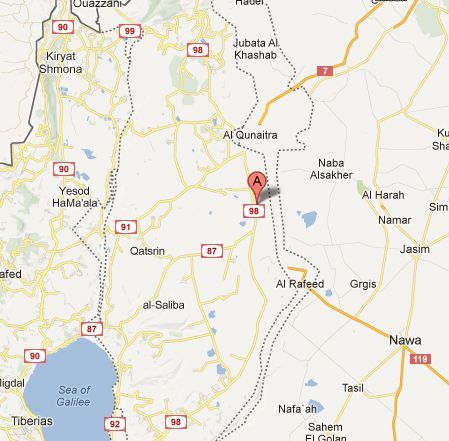Hezbollah’s Headaches
• Syrian rebels said they injured or killed Hezbollah’s number two man in an attack on a Syrian convoy on the outskirts of Damascus.
The reports say Sheikh Naim Qassem, who is Sheikh Hassan Nasrallah’s deputy, was returning to Lebanon after a high-level meeting with Syrian officials.
Hezbollah’s official line is that its people fighting in Syria went on their own; Qassem’s way too big a fish to rendezvous with such Syrians on his own personal initiative. Nasrallah’s got some ‘splaining to do.
• The trial of Hossam Yaakoub, who was caught scouting Israeli targets in Cyprus for Hezbollah continues to shed light on the terror group’s European activities. Documents obtained by the Washington Post continue to fill out Hezbollah’s aims:
The evidence echoes discoveries by investigators in Bulgaria and prosecutors in Thailand, India, Azerbaijan, Kenya and other countries hit by a wave of attempted assassinations and bombings linked to Hezbollah or its chief sponsor, Iran. U.S. officials characterize the plots as part of a shadow war directed by Iran in part to retaliate for Western efforts to derail Iran’s nuclear program. Evidence uncovered by investigators portrays a professional, well-funded effort by Hezbollah to recruit, train and position European-based operatives for what U.S. analysts describe as preparations for future terrorist operations.
While most of the attacks were thwarted or failed, the accumulated intelligence shows that Hezbollah is learning from its mistakes, employing the tactics of professional intelligence operatives to cover its tracks and expanding its threat, according to current and former U.S. officials, most of whom spoke on the condition of anonymity because of the ongoing nature of the inquiries.
• See also Dr. Matthew Levitt‘s take on Hezbollah’s headaches.
Iranian Atomic Urgency
• Another round of nuclear talks ended. This Reuters headline captures the prevailing mood of “Why are the mullahs smiling?”
• For the third time in two years, an Iranian attempt to launch a satellite went bust. According to Israeli press reports, the mullahs have been trying to cover up the failure.
• Israeli nuclear scientist Professor Uzi Even to the Times of Israel: Iran already has the uranium needed to make a bomb. It just doesn’t have a delivery system.
The final stage of enrichment, from 20 percent to weapons-grade fuel, can be done in a small space, far from the public eye. “The critical stage can be done underground, in something the size of a storage room, and no one would know,” he said. Even believes Iran has done precisely this already.
• Britain’s ambassador to Israel, Matthew Gould, weighs in on nuclear Iran at YNet.
Arab Spring Winter
• Israel repatriated six Syrians who received medical care at Safed’s Ziv Hospital. A seventh Syrian remains hospitalized. The Jerusalem Post writes:
A statement issued by the Israeli military said the Syrians’ repatriation “was completed at an undisclosed location for their own safety.” Israel and Syria are technically at war, and some anti-Assad rebels are jihadists hostile to the Jewish state.
• A Syrian tank shell landed in the Israeli town of Alonei HaBashan. According to the Times of Israel:
The shell, believed to be an errant shot from a battle between Syrian government forces and rebels, landed in an open area and did not explode. Sappers later disarmed it.

• Egyptian media picked up on the Muslim Brotherhood’s quiet efforts to amend the Camp David Accords.
A Freedom and Justice Party figure said Tuesday that the party’s legal committee is working on a new draft law to amend the peace treaty. It will be sent to President Mohamed Morsy, so he and the new parliament can review it after the April-May elections. . .
The draft law will amend the treaty so the Armed Forces can gain full control over the Sinai Peninsula, Suleiman added.
• The Washington Post reports that the White House is shifting gears on Syria and may “provide rebels there with equipment such as body armor and armored vehicles, and possibly military training, and could send humanitarian assistance directly to Syria’s opposition political coalition.” Elliott Abrams says it’s too little, too late.
(Satellite image via DigitalGlobe Inc/McKenzie Intelligence Ltd., Qassem via YouTube/AFP)
For more, see yesterday’s Israel Daily News Stream.

